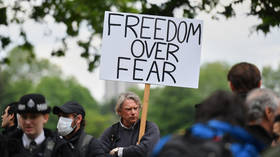It’s madness that therapists are cultivating fear about leaving lockdown. Most of us can’t wait to escape our Covid-19 caves

As restrictions start to ease, the MSM is full of alarmist stories from self-help quacks ramping up fear about a return to normality. But this determination to normalise lockdown constitutes a major threat to our freedom.
It seems that the therapy industry is determined to turn lockdown into a permanent lifestyle. Almost daily, we hear of yet another mental health professional warning about the psychological dangers associated with people’s anxieties about returning to normal.
The headline in the New Yorker says it all: “Reopening anxiety: What if we’re scared to go back to normal life?” You might have thought that what many people are most anxious about is the delay in getting back our normal freedoms. Not according to the New Yorker. The article cites numerous experts and therapists, who appear determined to highlight the mental turmoil facing people entering the post-Covid-19 real world.
Also on rt.com Lockdowns were deemed bad for our mental health. Now the psycho-babble industry’s inventing anxiety about a return to normal lifeAccording to Priya Parker, a so-called ‘conflict resolution facilitator’, “our social muscles have atrophied”. She calls going back to normality the phase of “re-entry”. She adds, “there’s extraordinary anxiety in that phase, and it’s not illogical or irrational anxiety”.
Numerous therapists actually celebrate the aspiration to stay at home and avoid “re-entry”. Arthur Bregman, a psychiatrist from Coral Gables, Florida, invented the term “cave syndrome” to describe our desire to stay at home.
Self-help advice about the trials of “re-entry” has become a growth industry. On the BBC website, a column titled “Covid: How to deal with social anxiety as restrictions ease” assumes that rather than enthusiastically embracing freedom, we are likely to pee in our pants when confronted with the prospect of “re-entry”.
Just in case you think it is OK to go back, the BBC invites us to reflect on “social anxiety disorder”, which they say is “a fear of social situations and includes worrying about meeting strangers, how to act with groups of friends and generally feeling self-conscious”. In case you don’t get its message, it warns that this disorder “can make everyday life extremely difficult and can manifest physically by causing sweating, palpitations or panic attacks”.
I have stopped counting the number of commentaries warning about the grave mental health impact of returning to normal life. What’s even more disturbing is that many of these commentaries actually assert that there is something really positive about people clinging on to a lockdown lifestyle.
A report on the CNBC website, “As the pandemic fades, some Americans are anxious about a return to normal,” notes that for many people, “the pandemic has brought about positive changes in their lives, and they’re afraid of losing what they’ve gained”. Its celebration of a lockdown lifestyle complements its alarmist warning about the psychological dangers of leaving our “Covid caves”.
Also on rt.com Sorry to be such a doom-mongering Jeremiah, but I fear we face THREE YEARS of wave after wave of Covid outbreaks and lockdownsIt is difficult to avoid the conclusion that many in the therapy industry and the media are invested in cultivating people’s fear of returning to normal life. They continually convey the assumption that most people are likely to be wary of letting go of their lockdown lifestyle.
“Tell us: are you anxious about the end of lockdown?”, asks the Guardian. It poses this question as a form of public service and adds that “The Guardian is looking to speak to people who are apprehensive about the prospect of lockdown ending”.
Either consciously or unwittingly, through the questions it poses, the Guardian is in the business of cultivating people’s sense of anxiety and helplessness. It asks: “Have you found yourself thriving in the pandemic and are therefore reluctant to return to activities or obligations you find challenging or stressful?”
Through posing these rhetorical questions, the newspaper helps reinforce the sense of powerlessness and helplessness that encourages people to adopt a lockdown lifestyle.
The Guardian’s approach is positively subtle compared to the Mirror’s gung-ho attack against the UK government’s plans to lift the lockdown. It can barely contain its joy when it reports the finding of its “exclusive Mirror poll”. The poll is headlined “More than half of Brits call on Boris Johnson to delay June lifting of lockdown”. It adds “half of us want Boris Johnson to delay June 21 lifting of curbs and three in four say people should go on wearing face coverings”.
Although I am sceptical of the Mirror’s ‘exclusive polls’ and it is unlikely that half of us want to remain in our caves, far too many members of the public have embraced the lockdown as their new normal.
The project of normalising the lockdown would turn us into passive helpless beings and constitutes a threat to human freedom. We need to fight back and challenge the idea that we have to adopt a new normal. Living freely is the only normal worth living for.
Like this story? Share it with a friend!
The statements, views and opinions expressed in this column are solely those of the author and do not necessarily represent those of RT.















